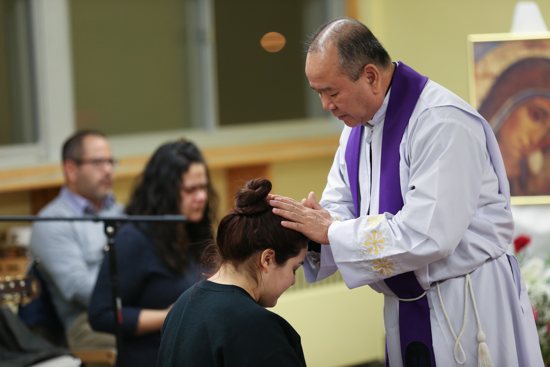
In early 2013, Karenni priest Father Saw Joseph Kureh was 46 and running a parish in the Loikaw diocese in the Karenni State in Myanmar when his bishop suddenly asked him to go to the United States.
Father Kureh refused at first, but the bishop was adamant.
“No, your people are there,” he told Father Kureh, who is now associate priest at St. Bernard in St. Paul. The bishop explained to Father Kureh that American priests were requesting help from Karenni priests to minister to an influx of Karenni refugees in the U.S. who were fleeing persecution and war.
The bishop added, “So go and see them, pray with them and be with them.”
During the last 50 years, thousands of Karenni people, some of whom were Catholic or had previous exposure to Catholicism, fled from their homes in Myanmar’s smallest ethnic state, to refugee camps in the country’s border with Thailand as the Myanmar military persecuted and expelled them, Father Kureh said.
Myanmar, formerly known as Burma, has struggled for decades with repressive military rule, widespread poverty, civil war and poor governance, according to the Council on Foreign Relations, a nonpartisan foreign policy resource.
In 2006, about 20,000 Karenni people living in Thai refugee camps were allowed through United Nations refugee resettlement programs to apply and resettle in countries including the United States. Between 2006 and 2015, about 15,000 came to the U.S., according to a ResearchGate journal article.
Father Kureh and several other priests from his diocese followed their bishop’s request and fanned out across the U.S. to locations where the Sino-Tibetan people resettled.
After serving for two months in several Karenni communities in the Eastern U.S., Father Kureh was assigned to St. Bernard. He continues to care for “his people” of about 80 Karenni families and draws them into community with the Church by inviting them to Sunday Eucharist, initiating them in the sacraments, and providing faith formation and other opportunities for community fellowship.
Many of the Karenni people in the U.S. learned aspects of the Catholic faith from catechists who visited their villages in Myanmar and in the refugee camps, but few were initiated into the sacraments, Father Kureh said. At the same time, he said, some continued to practice non-Christian animist traditions. Animists believe that objects, places and creatures have distinct, spiritual essences. Of the estimated 200 total Karenni families in Minnesota, a few continue in those traditional practices or other religions, Father Kureh said.
Recognizing that Karenni people need more Catholic teaching, Father Kureh encourages them to attend the 10:30 a.m. Sunday Mass at St. Bernard, where he preaches his homily in Karenni, Burmese and English. Some of the readings and music are also in Karenni. Father Kureh is the only priest at St. Bernard who speaks the language.
Ten other parish families from other regions of Myanmar speak Burmese, while a few native English speakers, Hispanic/Latinos and Vietnamese also attend the Mass, he said.
Karenni people view the Eucharist as a mystery; Father Kureh said once they accept it, they become very devoted to it and are more likely to attend the Sunday “Karenni” Masses.
“We draw them into the Church and to the Eucharist because as Catholic people, the Eucharist is the first priority for spiritual nourishment, he said.
Father Kureh offers the Karenni people options for weekly faith formation classes. Organizing the classes has been complicated somewhat by the fact that the teenage Karenni children moving into the parish from other U.S. cities didn’t receive sacraments when they were younger, he said.
Father Kureh continues to encourage baptized parents to bring their children to formation.
“We want to encourage them more and more, you know, to understand about this and to send their children” to faith formation, he said.
Father Kureh said he hopes to someday return to his country but adds that it has become even less stable since he left. The central building of his diocese, he noted, is currently occupied by the Myanmar military. “All the bishops and priests have run away into the jungle from the diocese center.”
Here in Minnesota, Father Kureh is happy to see his Catholic Karenni community thriving, in part because of the Eucharist.
“They’re very, very close,” he said.









